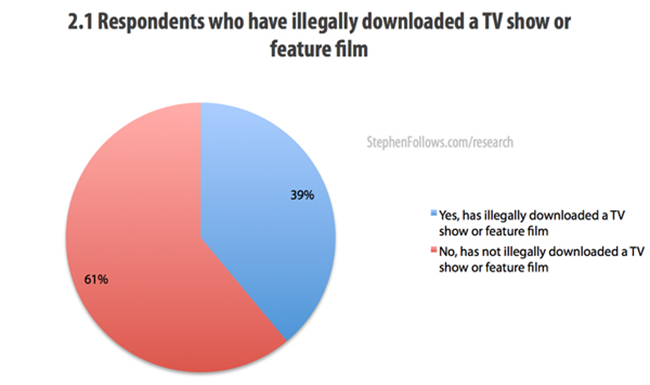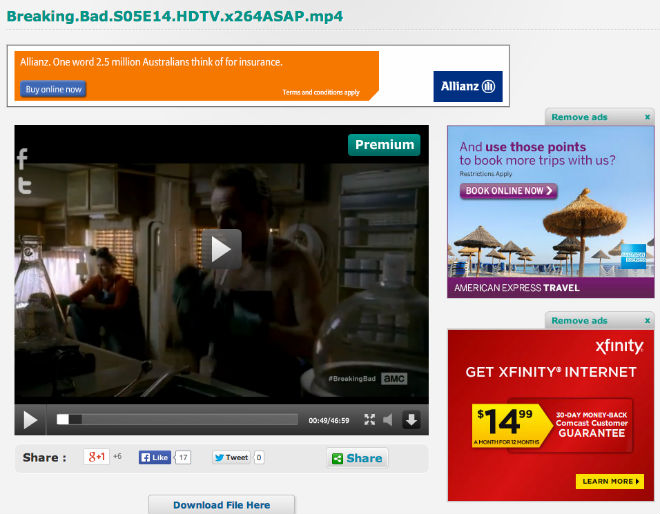TorrentFreak Email Update |
| 39% of Film Industry Professionals are Movie & TV Show Pirates Posted: 12 Apr 2014 02:34 AM PDT Reports, research and surveys covering piracy-related issues have been released in their dozens in recent years, with many of them painting a picture of two distinct groups of people – those who illegally download and those who pay for content. Of course, the reality is that many people who obtain content for free also cheerfully pay for content too. In fact, some studies have found that the entertainment industry’s best customers are also illegal downloaders. But what if there was evidence to suggest that some of those pirates were actually the very people helping to create movies and TV shows? That’s one of the intriguing findings of a survey carried out by Stephen Follows, a writer and producer with a keen interest in discovering what makes the industry tick. “Many of the decisions in the film business are based on gut, opinion and gossip so I find it fascinating to research the topics and see what the numbers say,” Follows informs TorrentFreak. “Piracy seemed like a ready topic to research so I added a few question into a survey I ran of 1,235 film industry professionals. The respondents were all people who had been to one of the three major films markets in the past five years – Cannes, Berlin or the American film Market.” Follows first set of questions focused on whether the film professionals felt that piracy had affected their business. The responses were then split by industry sector and budgets the professionals work to. Considering the anti-piracy rhetoric coming out of Hollywood during the past thirty years, it’s perhaps surprising that 53% of all respondents said that piracy had either no effect or a positive effect on their business.  Respondents were from all sectors of the industry including development, production, post-production, sales and distribution, exhibition and marketing. When the responses from each sector are broken down, one can see that respondents in sales and distribution – arguably the role that file-sharing fulfills – say they are most worried by piracy.  Turning the tables to discover how the industry professionals are themselves affecting piracy rates couldn’t be approached directly for obvious reasons, so Follows tried a different tactic. “When it came to researching how many of them actually illegally download movies I felt I needed to be a bit sneaky,” he told TF. “To one randomly assigned set of participants I presented three statements “Then, to a different randomly assigned set I offered the same three statements with the additional statement ‘I have illegally downloaded a TV show or feature film’. By subtracting the average number of agreed-with statements from the average of the control group I was able to calculate the percentage of people who agreed with the additional statement.”  As can be seen from the diagram, 39% of the industry respondents admitted to illegally downloading video content, with 61% claiming never to have done so. Interestingly, respondents working on lower budgets were more likely to have illegally downloaded than those working on big budgets. “Only 2% of people working on films over $10 million admitted to illegally downloading a film or TV show, compared with 65% of those working on films under $1 million,” Follows explains. Also of interest is how the percentage of those who admitted illegal downloading fluctuated according to industry sector, with 55% of those in marketing saying they have grabbed movies or TV shows without paying versus zero percent in exhibition (movie theaters).  Sales and distribution, the sector that said they’d been most affected by piracy, accounted for the next lowest piracy ‘confession’ rate of 28%. “These are the middlemen behind the scenes of the industry who negotiate the rights between producers and cinemas/retailers. They are part of the reason why there are so many damned logos at the start of every movie,” Follows explains. “They have the largest vested interest in stopping piracy as they don¹t have many other reasons for doing what they do (unlike filmmakers who might be wanting to create art/entertainment) and no other source of income, unlike cinemas who make a fortune on Coke/popcorn etc.” Further reading on Stephen Follows’ research and methodology can be found here and here. A great video he produced for Friends of the Earth can be watched on Vimeo. Source: TorrentFreak, for the latest info on copyright, file-sharing and anonymous VPN services. |
| American Express Accuses Pirate Sites of ‘Stealing’ Their Ads Posted: 11 Apr 2014 10:29 AM PDT
By cutting off revenue through deals with payment providers and advertising agencies, they hope to make it less profitable to operate these sites. This is not an easy task, as there are many advertising companies who are still eager to team up with “rogue” torrent sites and streaming portals. Likewise, site owners often implement tricks to hide the site where the ads are displayed. As a result, several major brands see their ads showing up on sites they don’t want to be associated with. A few weeks ago a report from the Digital Citizens Alliance revealed that companies such as Amazon, American Express, Dell, Ford, Lego, McDonalds, Xfinity are contributing to the problem. These problematic ad placements were also highlighted by a publication of the Australian media and entertainment group mUmBRELLA, which focused on ads appearing on streaming portals such as watchseries.lt and videoweed.es. The report shows that American Express and other brands had their ads on display, and that the companies were asked for comment. As expected, none of the major brands said it willingly promoted its products through these pirate sites. However, the explanations that were given varied, and the response from American Express was the most intriguing of all. The payment processor’s media agency Mindshare says that the ads in question weren’t real ads at all. Instead, American Express accuses the pirate sites of “photoshopping” their banners into their designs, to increase site credibility.  Timothy Whitfield, general operations director at the responsible advertising placement outfit Xaxis, confirms this suspicion. "Now when we dug into it what happened is that in some cases they were using basic photoshopping skills to take an old creative from Amex and building it into the homepage and into the video leads and on the homepage of the website,” Whitfield said "It wasn't a real creative it was just someone who had photoshopped it into the site. Now the reason that we think they were doing that is that they were working very hard to make themselves look like a reputable website," he ads. While this type of banner ‘theft’ is certainly an option, TorrentFreak was unable to replicate the finding from a wide variety of locations. It is also unclear why the sites in question would give up valuable advertising placements. There is hardly any positive effect on the site’s reputation when it’s not done structurally. The insurance company Allianz was also caught advertising on pirate sites, but here the explanation was a more common one. According to Whitfield, Xaxis didn’t place the ad directly, but instead it loaded through several iframes thereby disguising the website where it appeared. Through this “nesting” technique pirate sites can trick advertising agencies and have higher paid ads. "Every man and his dog blocks these websites – Watchseries.it, Videoweed etc. – but because you're seven layers deep you don't know if it is one you have blocked or not," Whitfield said in a comment. Finally, HotelsCombined came up with yet another reason why their banners appeared on infringing websites. Again, without their explicit knowledge. Kristen McKenzie, global PR and content manager of HotelsCombined, explained that it may have been the result of ad-retargeting. HotelsCombined tracks people who visit their website, and their advertising provider then displays ads on some of the sites these people visit afterwards. "Our retargeting provider does not disclose their extensive list of networks, and with millions of different sites being accessed simultaneously in real-time, it is ultimately impossible for us to police where retargeting may occur,” McKenzie said. The above shows that getting rid of banners on rogue sites is proving to be more difficult than simply compiling a blacklist. It’s a cat and mouse game, much like the efforts to go after hosting companies and payment providers. And if pirates are starting to use Photoshop to promote brands for free, it’s never-ending. Source: TorrentFreak, for the latest info on copyright, file-sharing and anonymous VPN services. |
| You are subscribed to email updates from TorrentFreak To stop receiving these emails, you may unsubscribe now. | Email delivery powered by Google |
| Google Inc., 20 West Kinzie, Chicago IL USA 60610 | |
 Hurting the revenue streams of infringing sites has become a prime anti-piracy strategy for the entertainment industries in recent months.
Hurting the revenue streams of infringing sites has become a prime anti-piracy strategy for the entertainment industries in recent months.